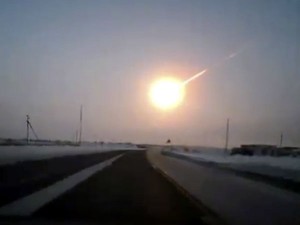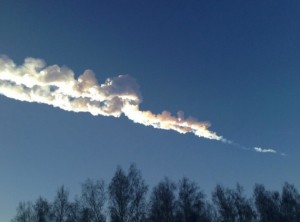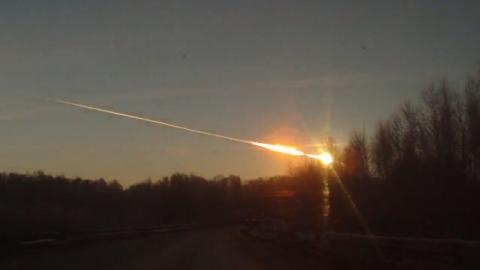An animated CNN announcer, echoing the conventional view, pronounced the mind-boggling overlap of a once in a hundred years meteor strike in Russia, which injured hundreds of people, and a near miss by a much larger asteroid on the same day “just a total coincidence.” Not so fast.
 Big questions, which can never be answered definitively, are raised by these events. Is something larger than the mundane existence of man unfolding on this planet? Without presupposing a ‘Supreme Being,’ is the universe governed solely by chance? And without projecting anthropocentrism, does humanity matter to the universe?
Big questions, which can never be answered definitively, are raised by these events. Is something larger than the mundane existence of man unfolding on this planet? Without presupposing a ‘Supreme Being,’ is the universe governed solely by chance? And without projecting anthropocentrism, does humanity matter to the universe?
The media, demonstrating an insensate inability to distinguish reality from actuality, always compares huge detonations to Hiroshima, ignoring the fact that tens of thousands of people were incinerated by that blast.
A more apt comparison is with the first nuclear detonation, ‘Trinity,’ in the Nevada desert. About the same size as the bomb dropped on Hiroshima less than a month later, it was about 30 times less powerful than the 500-kiloton explosion near Chelyabinsk on February 15th.
The largest explosion of an object from space ever recorded was also in Siberia, though 3000 miles to the east (Russia is a very big country), at Tunguska in 1908. It flattened half a million acres of forest, and was nearly 1000 times more powerful than Friday’s event. That was about 10 megatons, the size of the first hydrogen bomb test, ‘Mike,’ on an atoll in the Pacific in 1952. (The largest man-made explosion in history was the hydrogen bomb test ‘Tsar Bomba,’ by the Soviets in 1961, at over 50 megatons!)
That means one man-made nuclear bomb is still five times more powerful than the explosion from the largest asteroid or comet to hit the earth in recorded history. But riddle this: The ‘Chicxulub’ impact that wiped out the dinosaurs was 2 million times more powerful than Tsar Bomba. The universe may be trying to get our attention, but it’s just throwing marbles at us, for now.
Of course, asteroids and meteors have no minds, nor are they directed by the mind of a separate God. But that doesn’t  mean the universe has no intelligence, and acts purely randomly. That core premise of science is as much a religious belief as the belief in a ‘Supreme Being,’ and, I would submit, just as much of a fallacy.
mean the universe has no intelligence, and acts purely randomly. That core premise of science is as much a religious belief as the belief in a ‘Supreme Being,’ and, I would submit, just as much of a fallacy.
We think we know things, but we actually know very little. And even if we had millions of times more knowledge than we have now, our knowledge would still be a thin film on the surface of the universe. Besides, our meaning as human beings, I submit, is not just the accretion of knowledge but the negation of the known, enabling us to travel infinitely far within.
It’s the day after the strange meteor and asteroid coincidence, and there’s a somberness to the sunny skies of California that belies the superficiality of the world.
A great stillness sits upon the land. The sun is cloaked in high, thin clouds that cover the entire sky, but allow a faint bluishness. Shadows hang motionless, and time stands still.
A leaf blower is turned on. Thankfully it’s of the quieter electric variety, rather than the usual gas-powered type. Within three minutes, it inexplicably stops.
Even the eruption of a nearby car alarm does not disrupt the silence. The earth itself seems to be waiting for man. But waiting for man to do what?
 A single hummingbird lands on the feeder. Suddenly one realizes there are no other birds or birdsongs. Jays, robins, meadowlarks and finches usually take turns coming into the backyard, but none can be seen or heard in the area.
A single hummingbird lands on the feeder. Suddenly one realizes there are no other birds or birdsongs. Jays, robins, meadowlarks and finches usually take turns coming into the backyard, but none can be seen or heard in the area.
The moons of Jupiter come to mind, no doubt because the earth, covered with man, is as strange a place as there is in the galaxy.
For millennia people have seen comets and meteors as omens, for good or ill. We moderns in our hubris believe that we are much wiser, and see such an attitude as mere superstition, which we have left behind like the things of childhood. But the ‘total coincidence’ of the cosmic events of February 15, broadcast in real-time in the case of the asteroid, and YouTubed around the world within minutes with the meteor strike, have cut deeply into human consciousness, giving many pause.
Is the work of the transmutation of man, which is probably tens of thousands of years old, significantly moving, and a revolution in consciousness imminent; or is it hardly moving, and there will be nothing but more of the same division, conflict and fragmentation for humankind for the foreseeable future?
Clearly, the old order is dead, and cannot hold; clearly, the ‘sole remaining superpower is empty, and cannot lead. What is the way ahead? There is no choice but to create something new to fill the vacuum, but will enough people come up to the mark and begin to truly think together?
Never before have great things been more necessary, and more achievable for humanity. Yet never before have so many men and women, who don’t have to worry about where their next meal is coming from, set their sights so narrowly, and their bars so low.
Spiritually speaking, is humankind bound to time forever? Or does the human brain have the capacity, within itself, to transcend time and journey into eternity?
We don’t need to revert to smallness when overwhelmed by scale; we are capable of global response and cosmic relationship. Doesn’t the crisis of man and consciousness demand it?
When adequate response requires greatness, then greatness is simply adequate response.
Martin LeFevre

